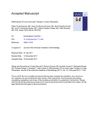Algorithmic Approach to the Treatment of Frontal Fibrosing Alopecia: A Systematic Review
October 2018
in “
Journal of The American Academy of Dermatology
”
frontal fibrosing alopecia hydroxychloroquine 5a-reductase inhibitors 5aRis platelet-rich plasma low-level LED light topical corticosteroids intralesional corticosteroids Dutasteride Finasteride Plaquenil Isotretinoin Acitretin Methotrexate oral corticosteroids Excimer laser FFA PRP LED light therapy topical steroids corticosteroid injections Propecia Accutane Soriatane oral steroids Excimer laser therapy

TLDR The review suggests there's no agreed treatment for Frontal Fibrosing Alopecia, but hydroxychloroquine and 5a-reductase inhibitors are most effective. New treatments like platelet-rich plasma and LED light could help if standard treatments fail.
The systematic review "An Algorithmic Approach to the Treatment of Frontal Fibrosing Alopecia" analyzed 22 studies involving 816 patients with Frontal Fibrosing Alopecia (FFA). The review found no consensus for FFA treatment, with current therapy aimed at preventing hair loss progression. The most effective therapies were hydroxychloroquine and 5a-reductase inhibitors (5aRis), with 72% of 83 patients treated with hydroxychloroquine and 70% of 297 patients treated with 5aRis seeing disease stabilization or improvement. Despite decreased androgen levels in FFA patients, 5aRis may still be effective. The authors suggest considering emerging therapies like platelet-rich plasma and low-level LED light for patients with continued disease progression despite standardized therapies. The study concludes that randomized controlled trials are necessary to evaluate various FFA treatments. The review also presents an algorithmic treatment approach, starting with topical and intralesional corticosteroids, then moving to Dutasteride or Finasteride for postmenopausal women or women on reliable contraception, and Plaquenil for premenopausal women. If these fail, Plaquenil, Isotretinoin or Acitretin, and Methotrexate are recommended, with a short course of oral corticosteroids for rapidly progressing disease. Emerging therapies like PRP and Excimer laser are considered if previous treatments fail.












